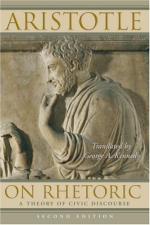
|
| Name: _________________________ | Period: ___________________ |
This quiz consists of 5 multiple choice and 5 short answer questions through Book II, Chapters 1-11.
Multiple Choice Questions
1. How did Aristotle explain the binding extent of contracts?
(a) They were not binding.
(b) Only between the courts and an individual.
(c) Only between two individuals.
(d) Only between two individuals or the courts and an individual.
2. How many different subjects of political oratory did Aristotle discuss in Book I, Chapter 4?
(a) Four.
(b) Three.
(c) Two.
(d) Five.
3. How did Aristotle differentiate between crime and punishment?
(a) Crime and punishment were immediate.
(b) Crime and punishment were remote.
(c) Crime was immediate while punishment was remote.
(d) Crime was remote while punishment was immediate.
4. According to Aristotle, what was the most basic cause of pleasure?
(a) Some kind of action in accordance with one's nature.
(b) Some kind of action in accordance with one's desires.
(c) Some kind of action in accordance with one's abilities.
(d) Some kind of action in accordance with one's instincts.
5. Which tactic was not included as something that an epideictic rhetorician might use?
(a) Exaggeration.
(b) Comparison.
(c) Competition.
(d) Amplification.
Short Answer Questions
1. According to Aristotle, what was the orator's chief goal?
2. Why did Aristotle think the political rhetorician should show that their proposal was in line with the audience's happiness?
3. What was the difference between rhetoric and dialectic in the logical appeal?
4. What did Aristotle say was the chief concern of political rhetoric?
5. Which cause of human action did Aristotle mention as always being unpleasant?
|
This section contains 296 words (approx. 1 page at 300 words per page) |

|




